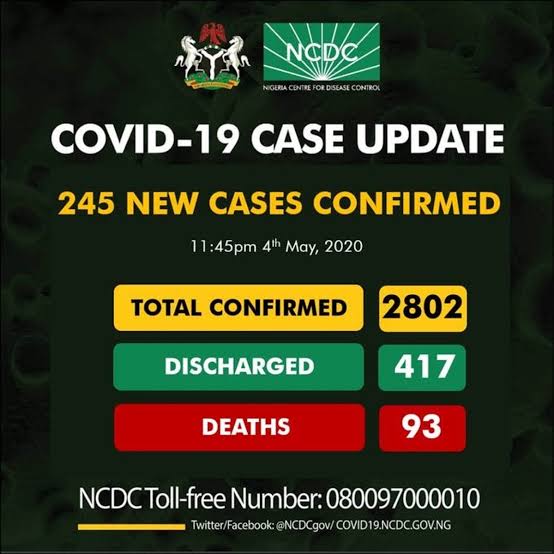The Nigeria Centre for Disease Control (NCDC) on Monday recorded 245 new cases of Coronavirus (COVID-19), bringing the total number of infections in Nigeria to 2802.
SEE ALSO: Extended lockdown: Lagos Doctors Urge Provision of Adequate Protective Wears
The NCDC also said that six new patients had been confirmed killed by the virus in the country, bringing the total number of deaths to 93.
The agency, on its confirmed twitter handle, on Monday night, said that the 245 new cases were recorded from 16 states.
It gave the breakdown as follows: 76-Lagos, 37-Katsina, 32-Jigawa, 23-Kano, 19-FCT, 18-Borno, 10-Edo, 9-Bauchi, 6-Adamawa, 5 each from Oyo, and Ogun, while one each from, Ekiti, Osun, Benue, Niger and Zamfara.
According to NCDC, as at 11:45 p.m., May 4, Nigeria has 2802 Active Cases of COVID-19 and 417 treated and discharged in the country.
Meanwhile, the Federal Government says it might be forced to implement another lockdown if Nigerians do not comply with social distancing measures.
Dr Chike Ihekweazu, Director General of the NCDC, who stated this at the Presidential Task Force briefing on COVID-19, said businesses must also join hands to implement the required health measures.
Weeks of lockdown in Lagos and Abuja and Ogun states were eased on May 4, but crowds clustered at banks and other public spaces, defying the government’s advisories.
“Initial reports are not too pleasing across the country,” he said of the lockdown compliance.
Ihekweazu noted that the decision of banks to open only a few branches could be counterproductive as people troop to the limited options.
He said: “So, there’s only so much we can do.
“We can produce all the guidelines in the world, we can preach, hold press conferences, but if organisations are not going to support the implementation of these measures and help us manage the risk, how do we want to manage and mitigate the risk of exposure, the risk of transmission?”
The DG said there was no doubt that Monday’s behaviour would result in more infections, but urged the nation to learn from it or return to square one.
“Yes, we knew today would be a problem.
“Everybody here knew today would be a problem, because for the first time people were let out of their homes.
“But now that we have seen the sunlight again, the challenge for us as a society is how do we now organise ourselves to mitigate this risk to limit transmission.
“Yes, we might have a few extra transmission today and tomorrow, but what we don’t want is an explosion of new infections.
“If we do have that new explosion, there would be almost no choice for the leadership of the country than to ask everybody to go back into our homes,” he said.

